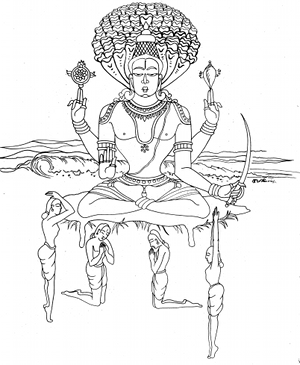What is the Soul?
 I-2 Yogaḥ Citta-Vṛtti -Nirodhaḥ - CVN
I-2 Yogaḥ Citta-Vṛtti -Nirodhaḥ - CVN
The state called Yoga naturally arises when we continuously practice directing (nirodhaḥ) the cognitive processes (vṛtti-s) of the mind (citta).
Soul – Many Terms – Many Roles Ātmā That which pervades everywhere
Jiva The individual soul that lives in the body for a temporary period of time like a tenant
Puruṣa Saņkhya Philosophy’s term for the Soul’s passive state of Being with the power to perceive and experience. It is a passive observer/perceiver and is resident of the puram (the town), half sleeping like images of the reclining Viṣnu/Buddha. In its passive Observer/Perceiver form, Puruṣa is a synonym for the Cit in the YS. In its Active Seer form, Puruṣa is a synonym for the Drasta in the YS.
Cit The Yoga Sutra term for the Soul’s passive state of being – Pure Source of Consciousness – Source of the citta (mind - impure). It has the power to understand and is the One who is conscious in us as a silent Observer/Perceiver.
There is a debate as whether the citta (mind) decides to evolve or whether it is the Cit (Soul) who makes this choice. Is the Cit a distinct individual or inextricably linked to Source? Does the citta have any power to decide anything without the Cit, its Source? Your perspective depends on whether you are an Advaitan (Soul and Source are One) or a Dvaitan (Soul and Source are two).
In my view, both perspectives are true on a continuum of the Soul’s (Cit) evolution from limitation to the Freedom of realizing its Source as an eternal awake Spirit (Draṣţa). As long as we believe we are an individual soul (Cit), we keep evolving as an individual mind-soul (buddhi/citta + Cit) from life to life, somewhat disconnected from our pure unchanging Source/Spirit (Draṣţa). But when we become completely Free or Enlightened (Kaivalyam), all individuality ceases because the citta (mind) finally decides through freewill to surrender all of its activities (karma-s) to the dictates of its Source of Consciousness (Draṣţa). The student (citta) must decide she wants to learn from the Inner Knower/Teacher (Draṣţa).
Until that day, the Cit can only observe as a passive Puruṣa and cannot direct the show of our lives as an active Inner Teacher/Knower (Draṣţa). It cannot act as the master of our minds. What we call transformation of the soul is the citta (mind’s) gradually disidentification with the dictates of the world and instead listening to the guidance of its activated Draṣţa (Spirit). When Cit cannot identify who it is other than through the still unevolved citta (mind), we call that mix up “soul”. When that mix up ends, the individual soul has become re-identified with Draṣţa and has merged with its Source, Universal Spirit. The mind-soul’s transformation is finally complete. It has gotten off the wheel of life and death and is Free!
Draṣţa The Draṣţa is the YS term for Soul’s active state of Being with the power to actively perceive and experience , to attentively shine like the brilliant Sun. The Spirit in such an watchful state has become firmly rooted in its original state of being as the master of the mind.
When citta does decide to surrender to the Heart (Cit), the mind (citta) will evolve into a sattvic mind, pure enough to reflect the true nature of its Spirit (Draṣţa). Its kleśa-s will have decreased while its vivekam (inner wisdom) will have increased until it becomes continuous vivekam (Kaivalyam – Freedom). The mind (citta) has to decide to wake up the sleeping Giant (Puruṣa/Cit) within at which point the Cit becomes the active Master of the mind called Draṣţa in the YS.
I-3 Tadā-draṣtuh-svarūpe-avastānam
As a result of being in the state called Yoga (CVN), the Soul (Cit or Puruṣa), becomes firmly rooted in Its own original state of Being - Draṣta (Active Seer) and takes its rightful place as master of the mind (citta).
- The mind’s vṛtti-s (activities) have become so focussed in one direction for a sustained period of time (nirodhaḥ) that the mind (citta) takes the same form as the Cit (Soul). The Cit is now awake and free from the limitations of its mind-body lens of perception. It is now shining in its original form as Draṣta (Spirit) like the Sun.
I-4 Vṛttisārūpyam-itaratra
Otherwise, the Cit takes the same form as the citta’s (mind’s) vṛtti-s (5 mental processes).
- Svarūpyam means the Cit’s (Soul’s) original form (YS I,3)
- Sārūpyam means NOT the Cit’s (Soul’s) original/true form. In such a state of ignorance, the Cit (Soul) takes the same form as the mind’s vṛtti-s (YS I,4). The Soul is entrapped by the mind-body experience and cannot see clearly.
The Soul can only see what the mind presents to It through the mind’s mirror. Yoga practice is like using Windex. We have to continuously clean the mirror of the mind so that it can reflect the Light of the Spirit directly, not through a glass darkly.
For now we see in a mirror dimly, but then face to face. Now I know in part, but then I shall know just as I also am known ~1 Corinthians 12
Yoga Sutra Journal Questions for September
How do you experience that state called Yoga in your daily life? How do you undercover your natural state of Happiness and Joy? What activities help you reign in the untamed mind so that you can experience the Joy that naturally arises from that quiet state of body-mind? Can all of these activities promote that state of mind called Yoga? Can they all be considered Yoga practices?
